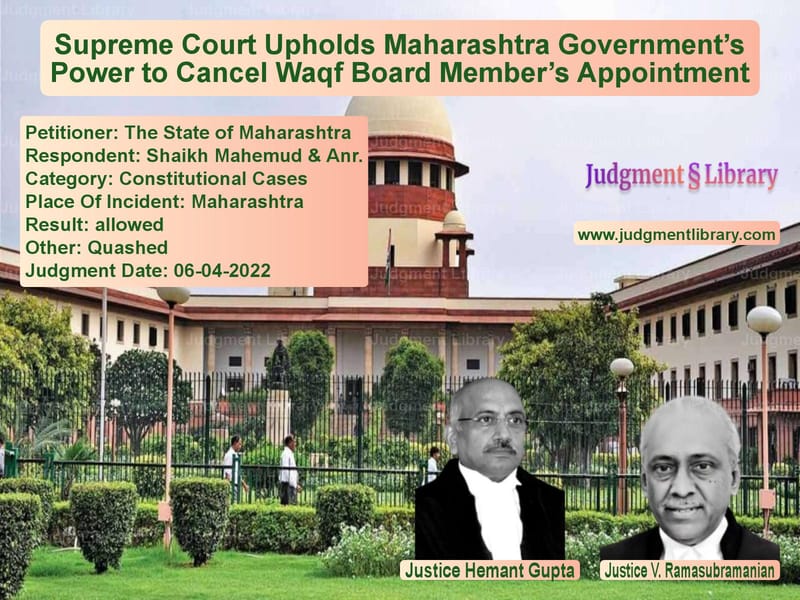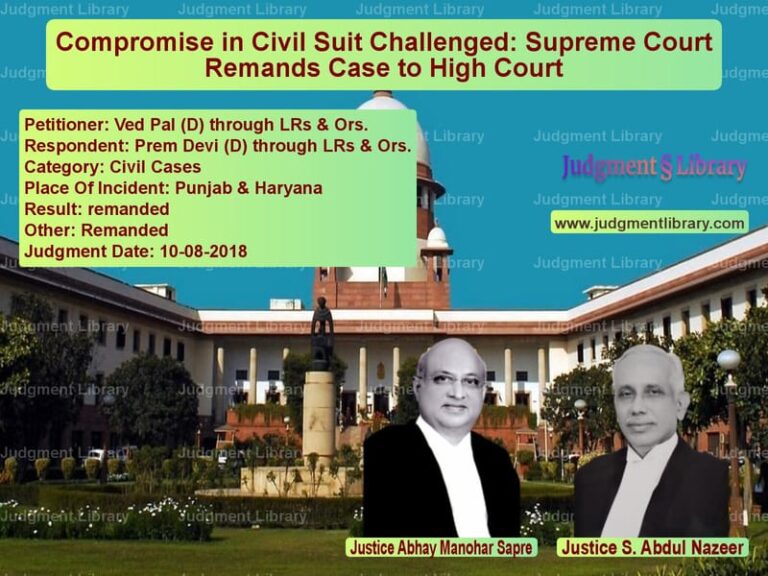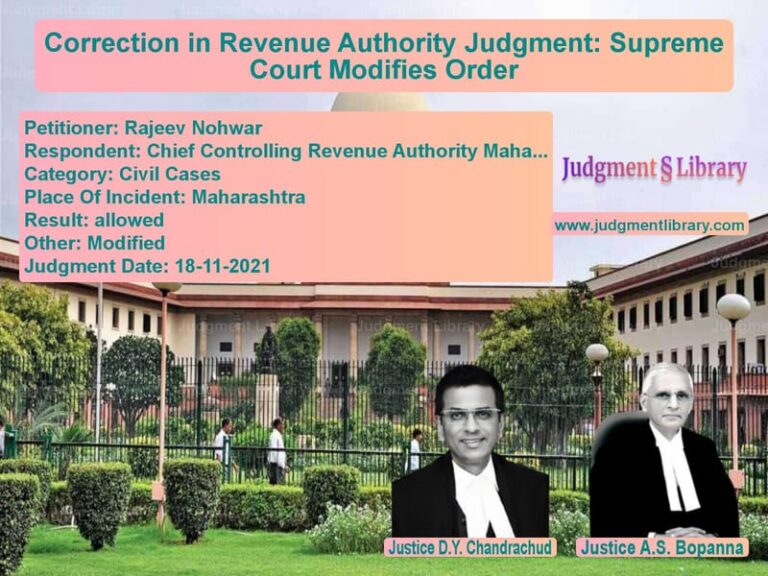Supreme Court Upholds Maharashtra Government’s Power to Cancel Waqf Board Member’s Appointment
The case of The State of Maharashtra vs. Shaikh Mahemud & Anr. dealt with a significant legal issue regarding the appointment and removal of members of the Maharashtra State Board of Waqfs. The Supreme Court ruled that the Maharashtra government was within its rights to cancel the appointment of a nominated Waqf Board member before the completion of the five-year tenure.
Background of the Case
The dispute arose when the Maharashtra government revoked the appointment of Shaikh Mahemud as a member of the Waqf Board, which had been made through a notification on September 13, 2019. This decision was challenged in the Bombay High Court, which ruled in favor of Mahemud and reinstated his appointment. The State of Maharashtra then appealed the decision in the Supreme Court.
Key developments in the case:
- September 13, 2019: The Maharashtra government appointed Shaikh Mahemud as a Waqf Board member.
- March 4, 2022: The government canceled Mahemud’s appointment.
- April 2022: The Bombay High Court ruled that the cancellation was arbitrary and reinstated Mahemud.
- April 6, 2022: The Supreme Court overturned the High Court’s decision and upheld the Maharashtra government’s authority to cancel the appointment.
Petitioners’ Arguments
The Maharashtra government, represented by its legal counsel, argued:
“The appointment of Waqf Board members is made under Section 14 of the Waqf Act, 1995. While elected members enjoy fixed tenure, nominated members serve at the government’s discretion, and their tenure can be revoked if necessary.”
Key points raised:
- Section 14 of the Waqf Act differentiates between elected and nominated members.
- The government retains the right to cancel the appointment of nominated members.
- The High Court incorrectly ruled that the cancellation was arbitrary without considering the government’s statutory powers.
Respondents’ Arguments
The respondent, Shaikh Mahemud, through his legal representatives, countered:
“The cancellation of appointment violates Section 15 of the Waqf Act, which provides for a fixed tenure of five years. The government’s decision was arbitrary and politically motivated.”
Key counterarguments:
- Under Section 15 of the Waqf Act, a board member is entitled to a five-year term.
- The government had no valid grounds to remove the respondent before the term ended.
- The High Court rightly ruled that the cancellation violated the principles of fairness and reasonableness.
Supreme Court’s Observations
The Supreme Court bench, comprising Justices Hemant Gupta and V. Ramasubramanian, ruled in favor of the Maharashtra government, holding that it had the authority to cancel the appointment of a nominated Waqf Board member.
Read also: https://judgmentlibrary.com/neet-pg-internship-deadline-dispute-supreme-court-upholds-cut-off-date/
The Court stated:
“The power to appoint includes the power to cancel an appointment. Section 14(9) of the Waqf Act mandates that members are appointed through a government notification. Since the respondent was nominated, the government had the right to revoke the nomination if deemed necessary.”
Key findings:
- The appointment of a Waqf Board member under Section 14 of the Waqf Act is either through election or nomination.
- Nominated members serve at the discretion of the government, unlike elected members.
- There was no violation of Section 15 since it does not override the government’s power to cancel nominations.
- The High Court misinterpreted the law by equating nominated members with elected members.
Final Ruling
The Supreme Court set aside the Bombay High Court’s order and ruled:
- The Maharashtra government was legally justified in canceling the respondent’s appointment.
- The writ petition filed by Shaikh Mahemud in the High Court stands dismissed.
- The decision reinforces the government’s power in appointing and removing Waqf Board members.
Conclusion
This ruling clarifies that the Maharashtra government has the authority to revoke the appointment of nominated Waqf Board members if necessary. The decision establishes a legal precedent distinguishing between elected and nominated officials in statutory bodies.
Petitioner Name: The State of Maharashtra.Respondent Name: Shaikh Mahemud & Anr..Judgment By: Justice Hemant Gupta, Justice V. Ramasubramanian.Place Of Incident: Maharashtra.Judgment Date: 06-04-2022.
Don’t miss out on the full details! Download the complete judgment in PDF format below and gain valuable insights instantly!
Download Judgment: the-state-of-maharas-vs-shaikh-mahemud-&-anr-supreme-court-of-india-judgment-dated-06-04-2022.pdf
Directly Download Judgment: Directly download this Judgment
See all petitions in Legislative Powers
See all petitions in Separation of Powers
See all petitions in Judgment by Hemant Gupta
See all petitions in Judgment by V. Ramasubramanian
See all petitions in allowed
See all petitions in Quashed
See all petitions in supreme court of India judgments April 2022
See all petitions in 2022 judgments
See all posts in Constitutional Cases Category
See all allowed petitions in Constitutional Cases Category
See all Dismissed petitions in Constitutional Cases Category
See all partially allowed petitions in Constitutional Cases Category







